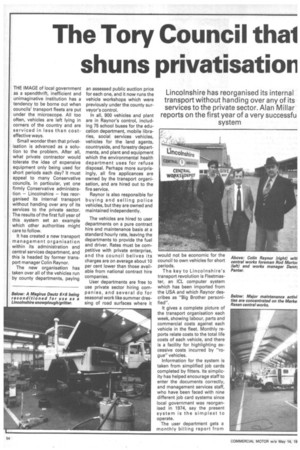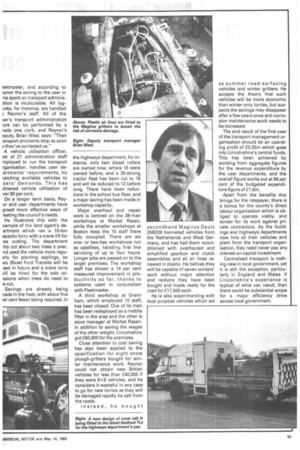The Tory Council thal shuns privatisation
Page 56

Page 57

If you've noticed an error in this article please click here to report it so we can fix it.
Lincolnshire has reorganised its internal transport without handing over any of its services to the private sector. Alan Millar reports on the first year of a very successfu system
THE IMAGE of local government as a spendthrift, inefficient and unimaginative institution has a tendency to be borne out when councils' transport fleets are put under the microscope. All too often, vehicles are left lying in corners of the country and are serviced in less than costeffective ways.
Small wonder then that privatisation is advanced as a solution to the problem. After all, what private contractor would tolerate the idea of expensive equipment only being used for short periods each day? It must appeal to many Conservative councils, in particular, yet one firmly Conservative administration — Lincolnshire — has reorganised its internal transport without handing over any of its services to the private sector. The results of the first full year of this system set an example which other authorities might care to follow.
It has created a new transport management organisation within its administration and central services department, and this is headed by former transport manager Colin Raynor.
The new organisation has taken over all of the vehicles run by county departments, paying an assessed public auction price for each one, and it now runs the vehicle workshops which were previously under the county surveyor's control.
In all, 900 vehicles and plant are in Raynor's control, including 75 school buses for the education department, mobile libraries, social services vehicles, vehicles for the land agents, countryside, and forestry departments, and plant and equipment which the environmental health department uses for refuse disposal. Perhaps more surprisingly, all fire applicances are owned by the transport organisation, and are hired out to the fire service.
Raynor is also responsible for buying and selling police vehicles, but they are owned and maintained independently.
The vehicles are hired to user departments on a pure contract hire and maintenance basis at a standard hourly rate, leaving the departments to provide the fuel and driver. Rates must be competitive with private enterprise, and the council belives its charges are on average about 10 per cent lower than those available from national contract hire companies.
User departments are free to use private sector hiring companies, and several do for seasonal work like summer dressing of road surfaces where it would not be economic for the council to own vehicles for short periods.
The key to Lincolnshire's transport revolution is Fleetmaster, an ICL computer system which has been imported from the USA and which Raynor describes as "Big Brother personified".
It gives a complete picture of the transport organisation each week, showing labour, parts and commercial costs against each vehicle in the fleet. Monthly reports relate costs to the total life costs of each vehicle, and there is a facility for highlighting excessive costs incurred by "rogue" vehicles.
Information for the system is taken from simplified job cards completed by fitters. Its simplicity has helped encourage staff to enter the documents correctly, and management services staff, who have been faced with nine different job card systems since local government was reorganised in 1974, say the present system is the simplest to operate.
The user department gets a monthly billing report from
eetmaster, and according to 3ynor the saving to the user in rie spent on transport adminisAion is incalculable. All log)oks, for instance, are handled ( Raynor's staff. All of the sees transport administration ,ork can be performed by a rade one clerk, and Raynor's eputy, Brian West, says: "Their ansport problems stop as soon 5 they've contacted us."
A vehicle utilisation officer, ne of 21 administration staff mployed to run the transport rganisation, handles user deartments' requirements, by latching available vehicles to sers' demands. This has chieved vehicle utilisation of ver 90 per cent.
On a longer term basis, Rayor and user departments have greed more effective ways of leeting the council's needs.
He illustrates this with the xample of the land agent's deartment which ran a 10-ton apacity lorry with a crane lift for .ee cutting. The department nly cut about two trees a year, nd used the vehicle more reguirly for planting saplings, so No 35cwt Ford Transits will be sed in future and a crane lorry will be hired for the odd ocasions when trees do need to le cut.
Savings are already being nade in the fleet, with about five ler cent fewer being required. In the highways department, for instance, only two diesel rollers are owned now, where 18 were owned before, and a 35-strong tractor fleet has been cut to 18 and will be reduced to 12 before long. There have been reductions in the school bus fleet, and a major saving has been made in workshop capacity.
Major overhaul and repair work is centred on the 38-man workshops at Market Rasen, while the smaller workshops at Boston keep the 10 staff there fully occupied. There are six oneor two-bay workshops run as satellites, handling first line servicing of up to four hours. Longer jobs are passed on to the larger premises. The workshop staff has shown a 14 per cent measured improvement in productivity so far, thanks to systems used in conjunction with Fleetmaster.
A third workshop at Grantham, which employed 10 staff, has been closed. One of its men has been redeployed as a mobile fitter in the area and the other is store manager at Market Rasen. In addition to saving the wages of the other weight, Lincolnshire got £60,000 for the premises.
Close attention to cost saving has also been applied to the specification for eight snow plough-gritters bought for winter maintenance work. Raynor could not obtain new British vehicles for less than £40,000 if they were 6x6 vehicles, and he considers it wasteful in any case to go for new lorries as they will be damaged rapidly by salt from the roads.
Instead, he bought secondhand Magirus Deutz 256D26 bonneted vehicles from the Netherlands and West Germany, and has had them reconditioned with overhauled and simplified gearbox and clutch assemblies and all air lines renewed in plastic. He belives they will be capable of seven winters' work without major attention and reckons they have been bought and made ready for the road for £17,500 each.
He is also experimenting with dual purpose vehicles which act as summer road-surfacing vehicles and winter gritters. He accepts the theory that such vehicles will be more economic than winter-only lorries, but suspects the savings may disappear after a few years once anti-corrosion maintenance work needs to be increased.
The end result of the first year of the transport management organisation should be an operating profit of £0.25m which goes into Lincolnshire's central funds. This has been achieved by working from aggregate figures for the revenue expenditure by the user departments, and the overall figure works out at 94 per cent of the budgeted expenditure figure of £1.6m.
Apart from the benefits this brings for the ratepayer, there is a bonus for the county's direct labour organisation which is obliged to operate viably, and tender for its work against private contractors. As the buildings and highways departments now hire all their vehicles and plant from the transport organisation, they need never pay any interest on capital investment.
Centralised transport is nothing new in local government, yet it is still the exception, particularly in England and Wales. If Lincolnshire's experience is typical of what can result, then there could be substantial scope for a major efficiency drive across local government.




























































































